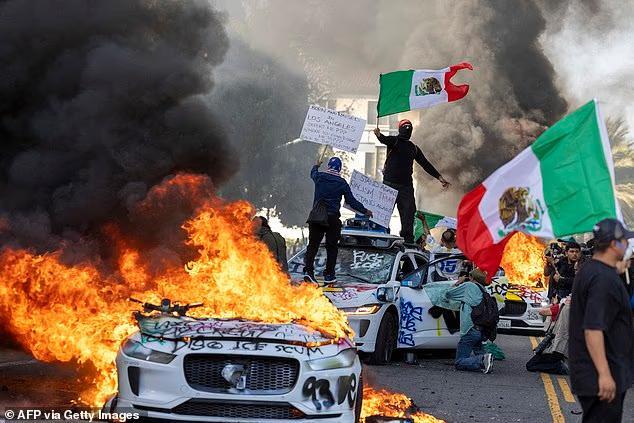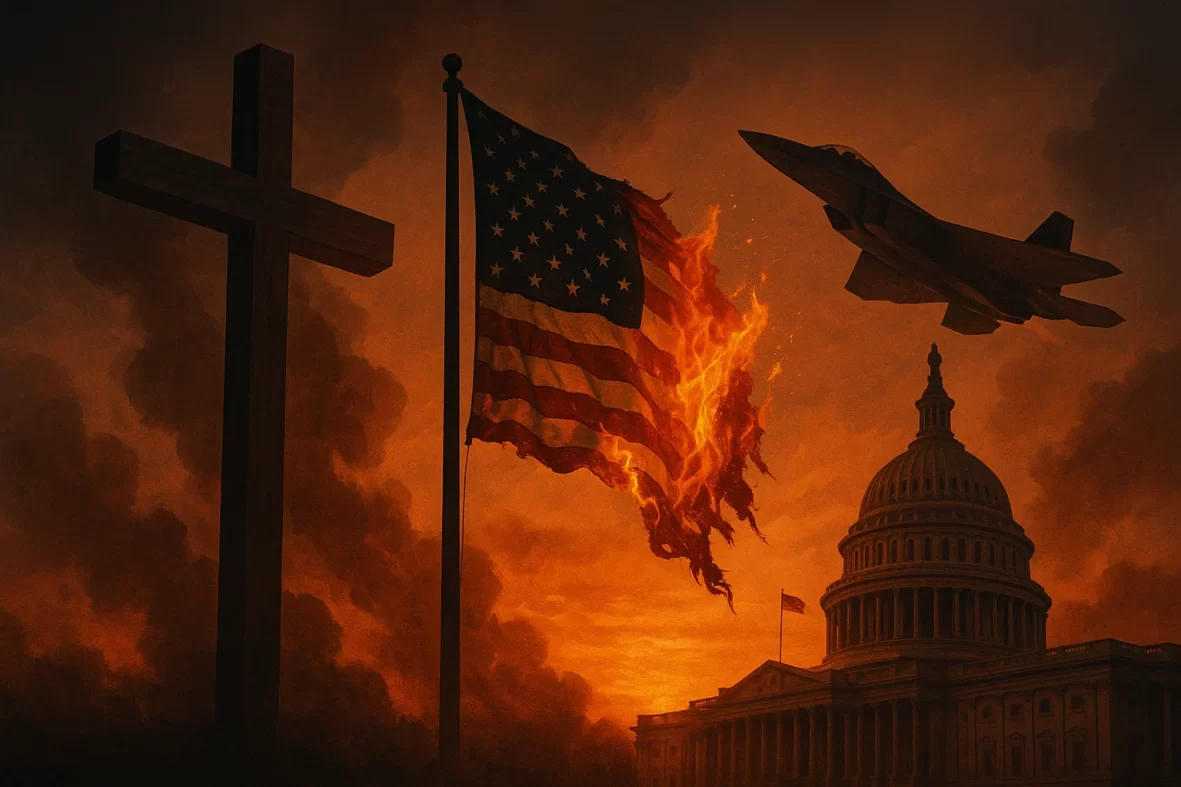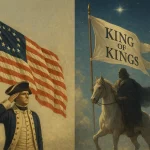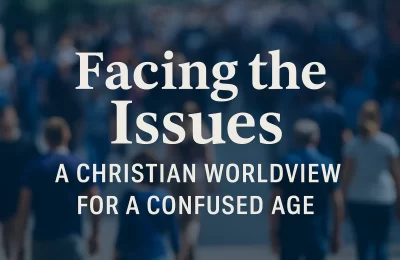Why America’s Crisis Isn’t Military or Migrants—It’s the Rejection of Christ’s Crown
Introduction:
When the Flags Burn and the Jets Roar
It began with two sounds.
One was the crackle of flames as protestors torched American flags on the streets of Los Angeles.
The other was the thunder of F-22s slicing through the D.C. sky in celebration of the Army’s 250th anniversary.
Two different altars. Two rival kings.
One crowned with steel, saluting strength.
The other shouted “No kings!” through megaphones and Molotov cocktails.
But beneath the pageantry and protests, beneath federal raids and sanctuary defiance, something deeper is unfolding—something theological.
This isn’t just about immigration. Or protest rights. Or presidential power.
This is about worship.
Because when a nation rejects every king, it doesn’t become free—it becomes chaotic.
And when people throw off every crown, they don’t walk away unruled—they simply enthrone themselves.
From Eden’s garden to the streets of California, one truth remains: our crisis is not political. It’s spiritual.

Bottom line?
What happened in June 2025 was not just a flashpoint of civic disorder—it was a mirror.
A mirror revealing a culture allergic to submission, addicted to autonomy, and desperate for clarity while running from the only true source of peace: King Jesus.
This article isn’t just commentary. It’s civic theology.
It’s a call to see through the smoke and pageantry and remember the only throne that’s not up for reelection.
Let’s go back to the beginning.
Let’s ask the real question: What happens to a nation that says, “No King”—and means it?
Part 1:
Two Competing Thrones—Washington and the Streets
On June 14, 2025, the United States marked not only Flag Day but also the 250th anniversary of the Army. It reenacted a familiar drama—two rival thrones on public display, both claiming moral authority, both missing the true King.
In Washington:
A Crown of Steel
Under the authority of President Trump, the federal government staged its largest military parade in modern memory. Tanks lined the streets. Fighter jets roared overhead. Soldiers saluted, flags waved, and a carefully choreographed narrative unfolded: strength, heritage, order.
In his address, the President declared:
“This celebration reminds the world that America’s greatness is forged by those who defend her… and we will not apologize for peace through strength.” (White House Press Office, June 14, 2025)
Supporters saw this as a rightful display of patriotism and executive leadership. Critics, however, decried it as a power play—a shadow of Caesar crossing the Rubicon. And while the Constitution permits such ceremonies, the tone and timing, amid mass protests and national tension, felt to many like a line crossed.
It was a celebration of sovereignty. But whose?
In the Streets:
A Cry of Rejection
Meanwhile, in over 2,000 cities across all 50 states, another narrative marched under the banner of “No Kings.”
Organized by the 50501 Movement (short for “50 protests, 50 states, one movement”), the protests were positioned as a grassroots resistance to authoritarianism. Their official website declares:
“We stand against tyranny in all its forms. We will not be ruled by billionaires, strongmen, or zealots. No crowns. No thrones. No kings.” (50501.org, Statement of Purpose, June 2025)
Their message? That America stands on the brink of losing its democracy to what they see as an emerging dictatorship—one draped in religion, military pageantry, and executive overreach.
But what began as a civil protest quickly became something more: a theological confession.
“No Kings” is not merely anti-Trump. It’s anti-authority. Anti-sovereignty. And, ultimately, anti-God.
Just as ancient Israel cried, “Give us a king like the nations” (1 Samuel 8:5), modern protesters cry, “Take all kings away.” Both are rejections of God’s rule. One through replacement. The other through revolt.
Irony in Full Display
The ironies stacked high that day were almost biblical:
- A billionaire (Christy Walton) funded full-page ads in The New York Times promoting a movement that decries billionaire influence.
- California lawmakers, who denounced federal enforcement as government overreach, simultaneously petitioned for federal disaster aid to rebuild after wildfires.
- In Los Angeles, protestors burned the American flag while waving Mexican flags—even as the riots stemmed from deportations of non-citizens unlawfully residing in the U.S.
These contradictions aren’t just political—they’re spiritual signs of disintegration. A society with no unifying truth will always fracture into narrative warfare, where the loudest voice is mistaken for the highest authority.
The Real Throne We’ve Abandoned
Both Washington and the protest movement were playing king that day.
One with soldiers and symbols. The other with slogans and street power. But neither acknowledged the King to whom all nations will bow (Philippians 2:10).
- The federal celebration declared, “We will secure peace through strength.”
- The protestors declared, “We will reject kings altogether.”
But Scripture tells a different story:
“Why do the nations rage and the peoples plot in vain? The kings of the earth set themselves… against the Lord and against His Anointed, saying, ‘Let us burst their bonds apart.’” —Psalm 2:1–3
This isn’t new. It’s ancient rebellion dressed in modern clothing. The very cry “No Kings” echoes Satan’s first lie in Eden: “You shall be like God” (Gen. 3:5). No authority but your own. No crown but autonomy.
A Civic Theology Reckoning
Here’s the core issue: America has forgotten how to submit—because we’ve forgotten who to submit to.
Without the Lordship of Christ, politics becomes religion, protests become sacraments, and every crown, left or right, is an idol or a target.
We weren’t made for kinglessness. We were made for a just, merciful, sovereign King. And until we return to that throne, we’ll keep choosing between tanks and tantrums, force and fury—never finding the justice we’re longing for.
Part 2:
The L.A. Flashpoint—Order, Outrage, and a Legal Crossfire
If June 14 was the stage, then Los Angeles was the spark—igniting a constitutional crisis, a spiritual confrontation, and a civic wildfire that burned far beyond California.
It began not with protests or parades, but with paperwork—federal warrants, ICE field orders, and public safety alerts. Over the course of 72 hours leading up to the protests, U.S. Immigration and Customs Enforcement (ICE) initiated a series of multi-agency immigration enforcement actions across Southern California.
According to ICE’s official June 12 press release:
“Operation Safe Hold is a targeted enforcement action focused on individuals with existing removal orders and criminal convictions. All arrests have been made in compliance with federal law, and with judicial warrants where applicable.” —ICE, Public Affairs Office, June 2025
But to many in California’s sanctuary government—including L.A. Mayor Karen Bass and Governor Gavin Newsom—this wasn’t law enforcement. It was provocation.
What Happened on the Ground?
ICE executed raids at:
- Home Depot parking lots and warehouses
- Several homeless shelters and clinics
- Known smuggling hubs and bus depots
Arrests were made swiftly. Some individuals resisted. Others fled. Over 470 arrests were confirmed by DHS by June 14.
Protests followed within hours—initially peaceful, but quickly devolving:
- Public buildings were vandalized
- Federal officers were injured by thrown concrete and glass
- Autonomous vehicles and city cars were set on fire
- Protesters waved foreign flags, burned American ones, and clashed with law enforcement
The protest in L.A. wasn’t merely a policy reaction. It was an identity confrontation—with immigrants, activists, anarchists, and ordinary citizens all converging under the banner of “resistance.” And it raised a foundational question: who has the right to govern when moral instinct collides with lawful authority?
The Legal Crossfire: Authority Meets Rebellion
The Lawful Role of ICE
Federal immigration enforcement is clearly authorized under the Immigration and Nationality Act (INA):
- 8 U.S.C. § 1357 gives ICE agents the right to arrest undocumented individuals in public spaces, with or without a criminal charge, so long as they are in violation of U.S. immigration law.
- 8 U.S.C. § 1226 and § 1231 permit removal proceedings for those with final orders.
Critics called the raids “inhumane.” But legally, they were authorized, targeted, and not unprecedented.
California’s Response: Lawful Resistance or Lawless Posturing?
California’s sanctuary laws, such as SB 54, do not prohibit ICE from acting—but they do forbid local law enforcement from assisting in most cases.
Governor Newsom issued a statement on June 13:
“The deployment of federal agents and the militarization of L.A. is a disgrace to the values of this state. We will not be intimidated into violating our commitment to human dignity and due process.”
While he is within his rights to refuse cooperation, he is not permitted to obstruct federal agents acting under federal law. And when violence erupted in L.A., that refusal became a moral liability. California wanted the benefits of sovereignty—but not the burdens of responsibility.
Federal Force: The National Guard and the Marines
With downtown Los Angeles burning and local resources stretched thin, President Trump federalized the California National Guard under 10 U.S.C. § 12406, asserting that the state’s refusal to control the unrest constituted a breakdown in civil order.
According to the Department of Defense statement on June 14:
“The President has the constitutional and statutory authority to federalize National Guard units in circumstances of rebellion, violence, or obstruction of federal law.”
This action was lawful and just.
But what happened next drew a constitutional red line.
The President also deployed 700 U.S. Marines from Camp Pendleton to support ICE and assist in “non-law enforcement logistical roles.”
This crosses into the domain governed by the Posse Comitatus Act (18 U.S.C. § 1385), which prohibits direct military involvement in civilian law enforcement unless explicitly authorized by Congress or the Insurrection Act.
That Act was never invoked.
No proclamation of insurrection was issued.
Federal Judge Samuel Breyer ruled on June 15:
“The deployment of combat troops under these conditions constitutes a dangerous precedent and a constitutional violation of the separation between military and civilian authority.” (Newsom v. Trump, 9th Circuit Filing, June 2025)
Though the ruling was temporarily stayed, the implication was clear: deploying the National Guard was within the President’s purview. Deploying Marines was not.
Irony, Identity, and Imported Rebellion
In a particularly sobering image from the June 13 protest in East L.A., several young men were seen burning American flags while hoisting Mexican flags, chanting, “¡Fuera ICE!” (“ICE out!”). Local news called it a “symbol of the immigrant struggle.”
But to anyone with biblical literacy, it echoed a deeper irony.
In Exodus 12:38, we read that a “mixed multitude” went up with Israel out of Egypt. But in Numbers 11:4, that same multitude was the source of grumbling, rebellion, and craving—pulling the people’s hearts back toward Egypt.
“Now the rabble that was among them had a strong craving… and the people of Israel wept again.” (Numbers 11:4)
America has welcomed many with compassion. But if we import grievance instead of gratitude, rebellion instead of repentance, we risk repeating the same spiritual pattern: chaos in the camp, and judgment from heaven.
The Biblical Balance: Sovereignty, Justice, and Mercy
The L.A. flashpoint teaches us this:
- Law without mercy leads to hard-hearted governance.
- Mercy without law leads to moral anarchy.
- True justice is only found when sovereignty is submitted to the King of kings.
Romans 13 gives the state the sword—not to use against the poor or weak, but against those who threaten peace and order. Exodus and Deuteronomy remind us to love the sojourner—but not by undermining truth or rewarding rebellion.
In this moment, we don’t need more protests or parades.
We need a return to righteous rule under a greater throne.
Part 3:
A Fair but Faithful Critique of All Three Spheres
In the face of chaos—federal raids, burning flags, political posturing—it’s tempting to pick a side, raise a banner, and declare our tribe victorious.
But the Church must never become a mouthpiece for partisanship or an echo chamber of outrage. We are ambassadors of a different Kingdom. One that critiques not just their side but ours, not just the state but the street, not just the protest but the palace.
In this spirit, let’s evaluate the three dominant players in the June 14 flashpoint—the protest movement, the federal government, and the state of California—with both biblical fidelity and civic integrity.
1. The Protesters: “No Kings” and the Theology of Rebellion
Let’s begin with the No Kings movement. Their slogan sounds political, but it is deeply theological: a renunciation of authority, a rebellion against sovereignty—not just of man, but ultimately, of God.
Their rhetoric is unmistakable:
“No kings. No crowns. No thrones.” —50501 Movement Website, June 2025
This is not simply about resisting tyranny. It is the celebration of autonomy as virtue, and the rejection of submission as oppression.
From a biblical worldview, this posture is not prophetic—it is Adamic. It echoes Eden more than Sinai. Like Israel of old, who rejected God’s reign and demanded a king like the nations (1 Samuel 8), today’s protesters do the reverse: they reject all kings, including the One true King.
To be fair: many in the streets are sincere. They want justice. They fear tyranny. They long for dignity. Those are not wicked impulses.
But apart from Christ’s kingship, those longings become idolatrous. Justice turns into vengeance. Autonomy becomes anarchy. Flags are burned not in sorrow but in rage.
The Church must say this clearly: we do not support rebellion cloaked in the language of liberty. We preach repentance, not resistance; righteousness, not rage.
2. The Federal Government: Lawful Authority or Unchecked Power?
Next, the federal government.
President Trump’s deployment of the National Guard to restore order in L.A. was both lawful and justified under 10 U.S.C. § 12406. Civil unrest had overtaken the streets. Local resources were overwhelmed. California’s leadership refused to act decisively.
In this, the President acted as a rightful magistrate: protecting life, preserving order, and fulfilling the Romans 13 mandate.
But when Marines were deployed—absent a declaration under the Insurrection Act, and without clear limits on engagement—a line was crossed.
This was not law enforcement. It was an escalation.
Scripture does not give the state unlimited power. It gives the state a sword—not a sledgehammer. The role of civil government is not to dominate its people, but to serve as “God’s servant for your good” (Romans 13:4). When that sword is wielded for political optics or retaliatory messaging, it ceases to serve justice.
A president must uphold the law. But he must also honor the Constitution, the dignity of all people—including the undocumented—and the separation of military and civil jurisdiction.
Strength without moral restraint is not righteousness. It’s Roman.
3. The State of California: Compassion without Order
California’s self-proclaimed sanctuary status stems from what many believe is a moral imperative: to protect immigrants, resist overreach, and affirm human dignity. And at its best, that instinct reflects something biblical:
“You shall love the sojourner, for you were sojourners in the land of Egypt.”—Deuteronomy 10:19
But the same Torah also says:
“You shall not pervert justice.” (Deut. 16:19)
“You shall not show partiality in judgment.” (Lev. 19:15)
California’s leaders have shown deep compassion—but also deep inconsistency:
- They refuse to cooperate with ICE—even in cases involving criminal aliens.
- They deny the federal government’s authority—but demand its funding during wildfires
- They condemn federal overreach—but tolerate violent rioters, flag-burners, and anarchists in their streets
This is not mercy. This is partiality. A selective morality that embraces justice only when it aligns with ideology.
If Romans 13 affirms federal authority, then local resistance must remain lawful, peaceful, and truthful. To hinder law enforcement while enabling civil disorder is not civil rights—it’s civil unraveling.
Final Word: The Prophetic Center
The Church must not be the cheerleader of any of these three spheres. We must be prophetic to all and compromised by none.
- To the protesters, we say: There is a King, and His yoke is easy—if you’ll repent and bow.
- To the federal government, we say: Wield the sword lawfully, wisely, and with humility.
- To California, we say: Compassion must never be the enemy of justice, and order is not oppression when it protects the innocent.
Only King Jesus can perfectly hold truth and mercy, power and restraint, judgment and grace. And until the Church recovers that vision, we will continue to be swept up in tribalism, shouting into echo chambers while the city burns.
Part 4:
The Pattern of Rebellion—From Eden to Today
What happened in Los Angeles in June 2025 wasn’t new. It was ancient.
- A people rising up against the law
- Leaders refusing to submit to greater authority
- Outsiders inciting chaos for personal gain
- And at the center: a desire to cast off any crown but our own
This is not just the news cycle. It’s biblical anthropology—a pattern of rebellion as old as Eden.
It Started in a Garden: The First “No King” Movement
In Genesis 3, the serpent tempts the woman with a seductive idea: “You will be like God” (Genesis 3:5). Not just with God, not just blessed by God—but like Him. Autonomous. Sovereign. Self-ruling.
Adam and Eve had a King. He walked with them. Provided for them. Ruled in righteousness. But they traded His Lordship for independence—and the result wasn’t freedom, but exile.
This was the original “No King” protest.
“We will not have this God rule over us.”
And every rebellion since—against authority, against morality, against divine design—is just another ripple from Eden’s rupture.
From Babel to Babylon: The Political Theology of Revolt
In Genesis 11, the builders of Babel declare:
“Come, let us build ourselves a city and a tower with its top in the heavens, and let us make a name for ourselves…”—Genesis 11:4
They didn’t want a King. They wanted a monument to human sovereignty.
So God came down and scattered them—not because of architecture, but autonomy. Babel is not merely ancient urban planning—it’s a spiritual blueprint for all secular utopias: unity without truth, power without submission, and community without covenant.
Centuries later, Babylon would echo that same impulse under Nebuchadnezzar, declaring:
“Is not this great Babylon, which I have built by my mighty power… for the glory of my majesty?” (Daniel 4:30)
And God humbled him. Because rebellion doesn’t just challenge heaven—it invites heaven’s judgment.
Israel’s Pattern: Demanding Kings, Rejecting Prophets
Israel’s story is tragically similar. God was their King (1 Samuel 8:7). He delivered them from slavery, established just laws, and promised covenant blessing. But they wanted to be like the nations.
They cried out, “Give us a king!”
- Not a Messiah.
- Not a servant leader.
- A political figurehead. A military strongman. A cultural icon.
And even when God gave them kings, they rejected His prophets. They refused correction. They persecuted truth-tellers. And when the true King arrived—Jesus Himself—they cried once more:
“We have no king but Caesar.” (John 19:15)
That is the climax of rebellion: when the people of God declare allegiance to Rome over heaven, comfort over truth, Caesar over Christ.
Today’s Echoes: Rebellion Repackaged
Modern rebellion comes with hashtags and academic jargon, but the pattern is unchanged:
- In Eden, the rebellion was personal—“I will decide good and evil for myself.”
- At Babel, it was political—“We will unite without submission.”
- In Israel, it was religious—“We want a king, but not that King.”
- In L.A., it is cultural—“No kings. No crowns. No thrones.”
But the same spirit whispers underneath:
“You shall be like God.”
And the same judgment looms:
“Why do the nations rage and the peoples plot in vain?” (Psalm 2:1)
This is not just sociology. It’s spiritual warfare. Not just politics—but principalities.
Gospel Clarity in the Chaos
Here’s the good news: Jesus didn’t come to crush rebels. He came to redeem them.
The One they mocked as “King of the Jews” really was—and still is—the rightful ruler of all. But His crown was made of thorns. His throne was a cross. His conquest was resurrection. And His government is unlike any other:
- He rules in righteousness, not rage.
- He governs by grace, not coercion.
- He restores order through atonement, not aggression.
The gospel doesn’t just offer salvation—it reorders our view of authority. It teaches us to submit joyfully, to obey faithfully, and to hope patiently until the day Christ returns to judge the nations and reign visibly on earth (Rev. 19:11–16).
Until then, the Church must not mirror the rebellion of the world.
We must live as citizens of the Kingdom, where the pattern isn’t protest, but praise. Not defiance, but discipleship.
Part 5:
The Real King—and the Real Hope
When the world shouts “No kings!” and chaos rules the streets, the Church must not panic.
We already have a King.
His name is Jesus—not a mascot for moral causes, not a footnote to cultural outrage, but the risen, reigning Lord of heaven and earth.
And that changes everything.
Not Just a King—The King
Scripture does not present Christ as a metaphorical monarch. It presents Him as the literal, divine, cosmic ruler:
“On His robe and on His thigh He has a name written: KING OF KINGS AND LORD OF LORDS.”—Revelation 19:16 (LSB)
This is not sentimental. This is sovereign.
- He rules not just over heaven, but over history.
- Not just over hearts, but over nations (Isaiah 9:6–7; Psalm 2:8–12).
- Not just over the saved, but over every square inch of creation (Colossians 1:16–18).
When protestors cry out against kings, they’re not just rejecting monarchy—they are reenacting the rebellion of Psalm 2:
“The kings of the earth take their stand… against Yahweh and against His Anointed, saying, ‘Let us tear their fetters apart!’”—Psalm 2:2–3
But Psalm 2 does not end with rebellion. It ends with a warning and an invitation:
“Now therefore, O kings, show insight… Kiss the Son, lest He become angry and you perish in the way…”—Psalm 2:10, 12
There is no safe neutrality. Either Christ is King—or rebellion reigns.
Real Hope Doesn’t Come From Revolutions
There’s a dangerous myth—on both the political right and left—that hope can be legislated, secured, or enforced. That if we just get the right leaders, overturn the right laws, or take down the wrong statues, the kingdom will come.
But the Kingdom of God is not won by ballots or burned cities. It comes by regeneration, not revolution. It comes not with spectacle, but with Spirit-wrought repentance and faith.
“My Kingdom is not of this world.”—John 18:36
This doesn’t mean we withdraw. It means we resist the lie that earthly power can produce heavenly peace.
Our hope is not in Washington or Sacramento. It is in a returning King.
“From heaven we eagerly wait for a Savior, the Lord Jesus Christ.”—Philippians 3:20
The Church’s Role in a Time of Crisis
So what does this mean for believers watching riots unfold, flags burn, and authority crumble?
It means we must:
- Preach Christ crucified—not Caesar enthroned or culture restored.
- Model holy citizenship—honoring leaders without idolizing them, disobeying when conscience demands (Acts 5:29), but always with humility.
- Pray for peace and justice—even when both seem impossible.
- Refuse the tribal pull—because we belong to a Kingdom that cannot be shaken (Hebrews 12:28).
- Proclaim the gospel with urgency—because the shaking of earthly thrones reminds us: the King is coming.
Final Word: The Throne Is Not Empty
Let the nations rage. Let protesters chant. Let news cycles swirl and governments stumble.
The throne of heaven is not empty.
Christ reigns—and He will return.
And until He does, we live as outposts of that Kingdom. We preach truth, we pursue justice, and we invite rebels—not to riot, but to repent and believe the gospel.
There is only one rightful crown.
There is only one eternal government.
There is only one King who brings peace, justice, and rest.
His name is Jesus.
Come, Lord. Your Kingdom come.
Final Call: How Should Christians Respond?
The dust hasn’t settled in Los Angeles. The protests haven’t ended. The battle for the soul of the nation rages on—between parties, platforms, and the pounding drums of discontent.
But for the Church, the question isn’t “What side are you on?” It’s “Whose Kingdom are you representing?”
Here’s how we respond—not with fear or fury, but with clarity, courage, and King Jesus at the center.
1. Bow Before the Right Throne
Before we challenge any earthly king, we must bow before the eternal one.
This is not the time for vague spirituality or safe religion. This is the time for full-throated allegiance to the Lord Jesus Christ.
“Sanctify Christ as Lord in your hearts…” —1 Peter 3:15
Christians must stop acting like orphans in a collapsing empire. We are citizens of heaven—and our King is not up for reelection.
2. Disciple with Biblical Clarity
Parents, pastors, teachers—we must teach civic theology.
Not partisan talking points. Not blind nationalism or bitter deconstruction. But a robust biblical vision of authority, justice, and kingdom hope.
Teach Romans 13. Teach Acts 5. Teach Psalm 2. Teach that God established government—but it is not God. And when government goes rogue, we obey God rather than men—with humility, not hostility.
3. Expose False Hope—Gently
Our neighbors are hurting, angry, and confused. They’re hoping in systems that keep failing them. Christians must speak gently, but clearly:
- Political ideologies can’t save you.
- Street revolutions won’t sanctify you.
- Personal autonomy will destroy you.
But there is a King—righteous, merciful, and risen. His name is Jesus.
4. Engage as Peacemakers, Not Provocateurs
We are not called to stir the pot—we’re called to season it with salt (Matthew 5:13). That means standing for truth without cruelty, resisting evil without arrogance, and speaking with grace and precision in a world drowning in soundbites.
The real revolution is not loud. It’s faithful.
It looks like love in a courtroom. Courage in a classroom. Humility on a podcast. Hospitality to a stranger. Integrity in a ballot booth.
5. Long for His Appearing
This moment should not make us hopeless. It should make us homesick.
The failures of human government aren’t a reason to despair—they’re a reason to yearn for Christ’s return.
“Even so, come, Lord Jesus.” —Revelation 22:20
In a world allergic to thrones and addicted to autonomy, the Church doesn’t respond with rage—we respond with worship.
Not silence, but salt. Not panic, but proclamation.
Our King is not hiding. He is reigning—and He is returning.
One King. One Gospel. One Hope.
America needs more than political reform. It needs revival.
Not a revival of nostalgia or nationalism—but of truth, repentance, and gospel clarity.
Let the world rage. Let the flags fall. Let kings rise and empires crumble.
But let the Church stand—anchored in Christ, grounded in Scripture, and ablaze with the hope of a better Kingdom.
No king? No thanks.
We have one—and He’s coming soon.







